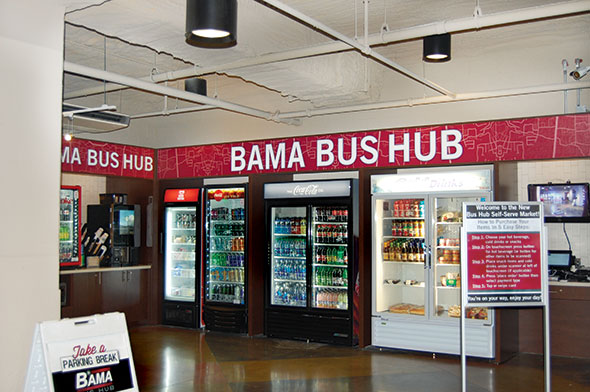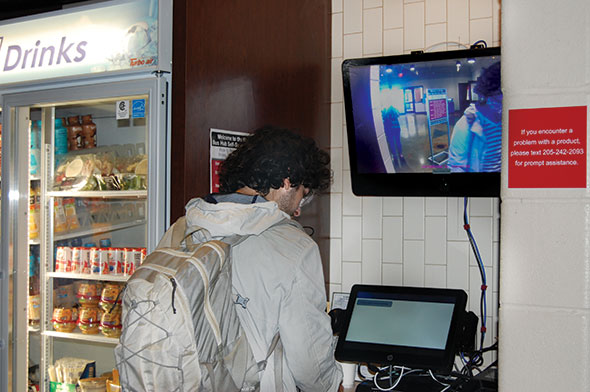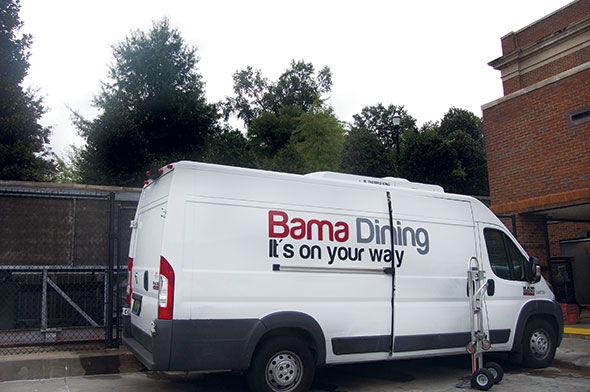Self-serve markets continue to grow in popularity across a variety of foodservice operator segments. The University of Alabama, though, took this to the next level by combining this setup with an academic research initiative and then rolling out two more of the markets.
In 2017, Dr. Darrin Griffin, an assistant professor in the College of Communication and Information Sciences (C&IS), approached Bama Dining about partnering with him on a research project focused on ethical behavior and deception. The study examined customers’ ethical decisions when making purchases from a micromarket that operates on the honor system. The study tested a theory of self-concept maintenance.

“This theory explains that people have two competing desires when dishonest behavior occurs,” Griffin says. “They want to maintain a positive self-image (e.g., be an honest person) while struggling with the notion that they may benefit socially or financially from dishonesty. Previous research finds that most people will cheat a little, just not enough to infringe on their positive self-concept. That is, people are great at rationalizing away small cheating.” He notes a story in the Wall Street Journal, “Why We Lie,” which addresses research that explains the notion that everyone has the ability to cheat in small ways.
Bama Dining responded by setting up a trial run of a concept called Trusty Snacks in the Reese Phifer building that houses C&IS. The concept was positioned in a hallway near the student lounge and set up as a temporary replacement for snack and soda vending machines, which were removed during the renovation of the student lounge. “The building was left without any food or beverage for students, faculty and staff,” says Kristina Patridge, director of University Dining Services, Enterprise Operations, which contracts with Aramark for Bama Dining. “We found an area to install merchandise shelving, a small refrigerated display unit and a point-of-sale kiosk.
The small market offered bottled water, cheese, sandwiches, salads, whole fruit and a variety of sweet and salty snacks. The POS ordering kiosk allowed students, faculty and staff to order and pay with campus debit card transactions.
The market operated from 8 a.m. to 4 p.m. “The c-store warehouse staff at a nearby location were tasked with recording initial stock, restocking and recording closing stock. Inventory was counted when it was put out on display, then counted again at 4 p.m. to see how much should have been sold,” Patridge says. “Bama Dining would then compare the inventory list with the sales report.
“The total sales for the semester was $7,552.57 and the total theft/loss was $758.48, or about 10 percent,” she says. The biggest challenge staff faced was ensuring that the products sold were replenished in a timely fashion, which required a lot of coordination by a dining team that was trying to run all of the other convenience stores across campus.
Bama Dining and C&IS ended the trial after one semester, as planned.
The Nursing School Market
Taking advantage of the trial operation’s success, Bama Dining introduced an expanded version of Trusty Snacks in the Nursing School called the Nursing School Market. Operating from 8 a.m. to 6 p.m., sales totaled $25,000 in one semester, with a 51 percent average food cost. The fall semester of 2018 saw 5,000 transactions and $16,294 in sales (a $3.30 check average). At that point Patridge considered the initiative sustainable.
A review of the sales data by Bama Dining’s unit controller associate revealed no appreciable loss at the Nursing School Market, Patridge says.
Occupying approximately 300 square feet, the unmanned Nursing Market is larger than Trusty Snacks. The Nursing Market offers nationally branded frozen food options, sushi, salads, sandwiches, an assortment of soft drinks, teas and other beverages, as well as health and beauty aids, phone chargers and other convenience items.
This market contains security cameras. “The cameras are there to deter people from theft; they are not monitored 24/7 but will be reviewed if we see a loss over a period of time,” Patridge says.
Bama’s Newest Self-Service Market
The location manager and warehouse personnel also supervise the newest market on campus, Bama Bus Hub Self-Service Market. Building on the success of the Nursing School Market, this 500-square-foot market provides foodservice to the campus community that travels through the bus hub during all hours of the day and night.
 A customer pays for self-serve selections at the POS system.
A customer pays for self-serve selections at the POS system.
All Crimson Ride transit buses come to this hub. When the bus system is not running, between 10 p.m. to 7 a.m., the university provides an on-demand shuttle service for students. The market that was previously in this location was only open until 5:00 p.m.
The micromarket features quick snacks and to-go meals, with options that include sandwiches and salads on display in a glass-door cooler. Staff at the commissary kitchen in the student union prepare these menu items. Other staff members deliver them to the Bus Hub Self-Serve Market daily. Sushi, made in Bama Dining’s Bento restaurant (located in a nearby residence hall), is also offered in the refrigerated cooler. “We will monitor sales and add another delivery time in the afternoon if needed,” Patridge says. Managers expect this operation to bring in $90,000 in annual sales from 15,000 daily transactions.
Similar to the Nursing School Market, the Bama Bus Hub Self-Serve Market contains a POS system that accepts campus debit card transactions and credit/debit cards. This operation also contains security cameras.
There is no substantial storage for food products behind the scenes, except for a small closet that holds bottled beverages, paper goods and condiments for the coffee and tea. A housekeeping staff member assigned to the building keeps the market clean. The manager and warehouse staff monitor the space several times a day and restock it as needed.
 A Bama Dining truck transports food and beverages to the two self-serve campus markets.
A Bama Dining truck transports food and beverages to the two self-serve campus markets.
Training customers to use this system requires a dedicated effort. “Training the customer is a big deal,” says Bruce P. McVeagh, resident district manager for Aramark for Bama Dining. An on-site retail manager helped with questions when the market first opened, and on-site signage continues to support customers and address how the operation functions.
Customer appreciation for the market runs high. “We get longer hours of operation at a location that itself is basically a 24-hour venue,” McVeagh says. “For instance, bus drivers are there all night and now they have an option for food and beverage that was not available before.”
As Patridge and McVeagh look to the future, they see a lot of potential for growth in buildings that aren’t viable for full-service, made-to-order dining concepts but can support unmanned operations.
Since the Bus Hub Self-Service Market is the first unit that is not in an academic building, Patridge says the dining team will make decisions on other locations based on how customers use the site as well as shrink factors. The team will measure success by sales volume, participation and customer satisfaction. Methods for collecting customer feedback include an annual survey, the Dining Service Development Committee, customer texts and location feedback e-mail forms.
Facts of Note
- Opened: August 21, 2019
- Scope of project: Installation of self-serve campus market at a campus bus station
- Size: Approximately 500 square feet
- Seats: 24
- Average check: $3.60
- Total annual sales: $90,000 projected
- Transactions: 15,000 projected annually
- Hours: 24 hours
- Menu specialties: A variety of grab-and-go foods, including sandwiches, salads, sushi and yogurt parfaits and beverages
- Staff: No dedicated staff, two stockers/replenishers
- Total project cost: $36,350
- Equipment investment: $21,350, including software licensing fee for POS
- Website: bamadining.ua.edu
Key Players
- Owner: The University of Alabama (UA) Dining Services, Tuscaloosa, Ala.
- Director of University Dining Services, Enterprise Operations: Kristina Patridge
- Location manager: Aaron McKnight
- Foodservice director, Bama Dining: Bruce P. McVeagh, resident district manager, Aramark
- Interior design: Sarah Lindsay Knight, UA Furnishings and Design
- Equipment dealer: Mobile Fixture and Equipment Co., Mobile, Ala.
- Construction: UA Facilities Maintenance, cabinet shop




